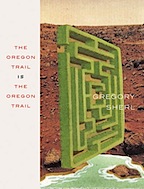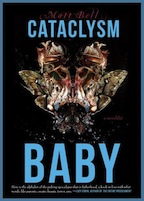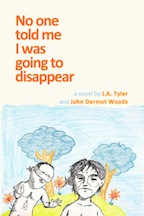
Book Reviews: May 2012
The Oregon Trail is the Oregon Trail, Poetry by Gregory Sherl
The Light Between, Poetry by Terry Blackhawk
Love, InshAllah: The Secret Love Lives of American Muslim Women, Nonfiction
Piano Rats, Poetry by Franki Elliot
Cataclysm Baby, Fiction by Matt Bell
No One Told Me I Was Going To Disappear, Fiction by J.A. Tyler and John Dermot Woods
Attack of the Copula Spiders, Nonfiction by Douglas Glover
 The Oregon Trail is the Oregon Trail
The Oregon Trail is the Oregon Trail
Poetry by Gregory Sherl
ISBN-13: 978-0983026365
Mud Luscious Press, January 2012
$12.00, 71pp.
Reviewed by Ed Bennett
Posted May 2012
In this multi-media world of instant communication, tweets and social networking, the line between fantasy and reality can become quite fluid. Gregory Sherl’s book The Oregon Trail is the Oregon Trail takes this phenomenon to a higher, more intimate level by basing this collection of poems on a computer simulation program. The Oregon Trail was developed in the 1970s to teach high school students about the dangers and privations faced by the western settlers in the last half of the 19th century. A player takes on the role of banker, farmer, or carpenter and begins his trek to California from the trailhead at the Mississippi River.
In Gregory Sherl’s collection of poetry a family begins the journey by fording dangerous rivers, succumbing to diseases like dysentery and syphilis, starving and, in general, suffering every step of the way. The poems are in the voice of the father as he speaks with his wife, his son and daughter and, occasionally, directly to the reader. The chronology of the work jumps from the 1800s to the present day with references to Ft. Kearney, smallpox blankets, Wal-Mart, and even Mel Gibson. Each poem is titled with a description of The Oregon Trail that can range from the mundane (“The Oregon Trail goes to church”) to the surreal (“The Oregon Trail is a deceased hippopotamus in tepid bathwater”).
Even readers who have little acquaintance with the computer simulation will find themselves drawn into this continuously moving miasma. As this family faces the perils of the plains and deserts, their fate is revealed with the matter-of-factness of a computer message flashed on a screen.
On the seventh day God rested.
Christopher has died of dysentery.
Each tragedy wears down the narrator until he is moving forward alone, questioning why he has made this journey in the first place. On a desolate stretch of the plains he says:
My wagon is a carcass of remorse.
I ford the river alone.
Sherl’s odd sounding title becomes clearer to us with each turn of the page. By the time we read the last of these well-crafted poems we realize that the Oregon Trail is not only The Oregon Trail, but a metaphor for life as well. Each poem takes a hard look at the many facets of life’s journey from different viewpoints, some of them directly head on and others from a skewed form of present/past understanding. The line length and structure of the poetry varies somewhat from page to page and is absolutely pitch perfect in the sensuality, the horror, and the boredom conveyed. Readers will be immersed in the game and the reality behind it, as well as the unsettling relationship with one’s own life.
This is a fine book of poetry, an adventure and a fantasy, a reality as well as a meditation on our daily existence. We are all playing this game with each breath we take. The Oregon Trail is The Oregon Trail, as Sherl tells us, but it is also the communal journey we all make.
 The Light Between
The Light Between
Poetry by Terry Blackhawk
ISBN-13: 978-0814336144
Wayne State University Press, February 2012
$15.95, 104pp.
Reviewed by Lori A. May
Posted May 2012
Terry Blackhawk’s sixth collection of poems examines the light that comes only as a result of darkness. The collection begins through the lens of the mythical wife Medea, as Section I focuses on betrayal and loss. “I have no language / to replace what I have lost,” the speaker declares. In this numbered series, Medea embodies elements of nature, forging on to redefine herself and “form a garland of revenge.”
The melancholy of loss and the struggle for closure continues on in Sections II through IV, as Blackhawk’s speaker travels in time through memory, reflecting on more contemporary reminders of what was and what remains. In “Wild Bird Rescue in Key West,” the speaker dances with the “what ifs” of a failed romance and asks, “Were we ever adequate as mirrors / to each other?” While recalling pelican bills and Palm Warblers, she contemplates the inability to rescue her own doomed relationship. “If the eye chooses what / the heart suspects, today I read storm warnings / in retrospect.” Here, nature is paralleled between wild and man-made kingdoms as the speaker begins to embrace the light after dark.
In the concluding Section V, Blackhawk demonstrates a playful side in poems that uplift and show the promise of what’s to come after darkness subsides. In “Imagining Billy,” the speaker does just that—imagines poet Billy Collins “stretched out on the bed [… ] / in the place now occupied by his new / and selected poems. He is wearing / striped pajamas […] purposefully selected for their classic, / formal lines.”
The Light Between cuts through the fog of a failed love and progressively reveals truths that seep through shadows and into the light.
 Love, InshAllah: The Secret Love Lives of American Muslim Women
Love, InshAllah: The Secret Love Lives of American Muslim Women
Nonfiction Anthology, edited by Ayesha Mattu and Nura Maznavi
ISBN-13: 978-1593764289
Soft Skull Press, February 2012
$15.95, 307pp.
Reviewed by Dani Burlison
Posted May 2012
Ah, to fall in love. The butterflies of spring brushing wings against vital organs, the hefty weight of broken hearts, the miracle of healing with time, the world at a stand-still during a first kiss with one’s beloved. It’s mind-boggling, exhilarating, tiring. And totally complicated.
Love, InshAllah: The Secret Love Lives of American Muslim Womentells these complex stories of love with fresh insight from a variety of seldom viewed perspectives—the voices of twenty-five American Muslim women.
Though the past ten years since 9/11 have revealed something about what it means to be Muslim in America, it is rare for the public to hear the voices of the women; particularly regarding how their roles as modern American Muslims inform their love lives. Love, InshAllah brushes aside assumptions with personal glimpses of love, marriage, sex, and the courage to embrace desires despite the stereotypes set in place.
Essays by Najva Sol and Tolu Adiba share fears and desires about living as lesbians within a religion that may not accept who they are. Tanzila Ahmed pulls us along with her heartthrob, touring through California and the South West with a Muslim punk band. Angela Collins Telles shares her knock-you-off-your-feet romantic tale of finding love with a non-Muslim in a faraway land. Ayesha Mattu finds love in post-9/11 America. Others share lovely, heartbreaking, suspenseful, and hilarious tales of arranged marriages, divorce, match-making services, lost love, discovering sexuality for the first time, and finding love as Muslim converts.
Complete with a handy glossary of terms and a list of thoughtful discussion questions,Love, InshAllah is not simply a collection of stories on being Muslim, nor is it a bundle of chick-lit only to be read in a bubble bath with a glass or two of rosé. It is a moving and honest guide that references the common thread shared by all who have loved and lost—and of course for those still seeking a soul mate and a comfortable place in the world.
top
 Piano Rats
Piano Rats
Poetry by Franki Elliot
ISBN-13: 978-0983422839
Curbside Splendor, October 2011
$10.00, 68pp.
Reviewed by Renée K. Nicholson
Posted May 2012
Originally a 100-count self-printed run, Franki Elliot’s Piano Rats, which was picked up by Curbside Splendor, is a genuine success story for a self-published artist. It’s no wonder that the book found a readership, as it unfurls like a friend’s whispered secret, slowly turning into a larger story. There’s intimacy between the poet, the unnamed “you,” and the audience, nothing overtly guarded. “I always liked your letters,” she writes in “Slow Process.” “They were always charming and blasphemous.”
Though categorized as prose poems, these don’t so much bend or straddle genre as defy it. They reveal and withhold information like literary nonfiction. Or, perhaps, these are prose poems functioning like compact lyric essays. Although each poem is discrete, there’s a cumulative effect to reading Piano Rats, as the poems form an organic whole, the pleasure in threading the meanings together into a loose-weave fabric.
There’s a curious and slightly cryptic dedication, which offers instructions on how to read these poems together:
This book is most obviously
dedicated to someone I used
to know…
Taking cues from this dedication, the poems vacillate between states of knowing and not knowing. One might be tempted to infer the book is about a former self, who could as easily be that “someone I used to know.”
Underlying the poems, expressed in compact narrative, is longing, recounting places and moments of memory with a confessional edge. There is a strong feeling of loss as well as sad-tinged nostalgia. This can be seen in “Wrong About Death,” in which the speaker says:
It’s been four years since we’ve seen each other
And still he never told me what happened those
nights he spent in jail.
Here, we clearly have the sense of looking back in “it’s been four years” and yet the mystery of the nights in jail is fully present in the now. This is just one way Elliot brings us quickly through what she knows for sure: even the people closest to us cannot be fully understood. It is both part of their allure and frustration.
Some revelations in the poems are refracted through the prism of self. In “I Thought We Were The Same Person”:
I liked your spine and your green eyes, your lips, your false sense of adulthood, all that left over sadness, and right there for a minute I thought we were the same person.
Invited in, like we were the same person, Franki Elliot’s poems invoke in us the promise of a shared reminiscence, even if the circumstances are hers to disclose, fresh and new to us.
 Cataclysm Baby
Cataclysm Baby
Fiction by Matt Bell
ISBN-13: 978-0983026372
Mud Luscious Press, April 2012
$12.00, 118pp.
Reviewed by Daniel Wallace
Posted May 2012
A man has three blind daughters, and when he begins an affair, they cut off his thumb. When he continues to cheat on his wife, he wakes to find “my hand gone, divorced from my wrist, a tourniquet tightened around my stump and my mouth cottoned with morphine.” Twenty-five other fathers have equally serious offspring problems—boys suffocating in their own fur, girls born merely as a voice. And each of their worlds is ending, in flood, infertility, or flies. Over and over, wombs murder, children mutate, the land is “bleached blank by the cloudy water that climbs thick and sluggish from my well.”
One can hardly call these “vignettes” when the language is so rich, when alliteration (“this waste of weather and wild”), rhythm (“upon a lightning-split husk, I stencil the twins that follow”), and other sonic patterns are so continually surprising, so vivid. Cataclysm Baby obsesses over our dependence on ephemeral and treacherous flesh, and yet the book frequently hints at stranger, more eerie reaches, beyond these terrors of pregnancy and birth—why, for instance, do the three daughters keep their father’s punishments secret from their mother? Such open questions play on the mind long after the conclusion of each brief piece. A few sentences that seemed an attempt to explain or wrap up the mystery, such as the moment when the father recognizes his daughters as “my three little furies,” however, lessen the effect.
With its children of air, earth, soot, and teeth, Cataclysm Baby recalls Italo Calvino’s masterpiece, Invisible Cities, another miniature encyclopedia of the unreal. But unlike the Calvino, in Bell’s book many of the vignettes requested the same emotion from me—pity for the narrator’s wretched situation, the horror of his ruined family or impending death (a representative first sentence is “And all around me, only disappointment”), and after a certain point, the supply of pity runs out. I found myself wishing for a second melody to enter Cataclysm Baby, some counterpoint to refresh my heart, soften me up, to make me again vulnerable to the book’s sufferings and horrors.
Editor’s note: Daniel Wallace reads from Cataclysm Baby on his blog.
 No One Told Me I Was Going To Disappear
No One Told Me I Was Going To Disappear
Fiction by J.A. Tyler and John Dermot Woods
ISBN-13: 978-0983195610
Jaded Ibis Press, 2012
Color $35.00, Black & White $16.99, 124pp.
Reviewed by Joe Ponepinto
Posted April 2012
To communicate what this story is requires describing what it is not. Tyler and Woods’s prose contains little of traditional literary techniques. The narrator, his sister, and none of the other characters mentioned have names. No backstory is introduced to explain their situation. Simple, experimental, and often challenging language pervades the text, accompanied by Woods’s equally cryptic graphics. Only the barest of plots is present, yet the story’s climax is as powerful as that of the most meticulously planned novel.
No One Told Me speaks from the mind of the male half of conjoined siblings who travel by train with a freak show. The pair appears to be caged like an animal when they are not on display. The narrator revels in the duality he shares with his sister, speaking mostly in first-person plural, but he also wonders at the possibility of their being separated. As the novel reveals no history, readers must guess at how they came to be—the text only hints at an Elephant Man-like maternal abandonment of the grotesque.
The authors have imagined the mind of someone human, but not quite human. Although childlike, this is not the voice of a child, but that of a primitive, spiritual being never indoctrinated into formal learning or the constraints of culture, and therefore unable to express its desires and fears in language we might easily understand.
Instead, the narrator speaks in an invented formulation of language dominated by sensory perceptions. His world is comprised of movements and sounds. Each impulse is shared by his sister, and none have the typical textual reference points that guide the reader through the development of the fictional universe of the story. Without those usual signposts connecting to the “real” world, the reader must accept the narrator’s existence for what it is, and understand that knowledge and certitude are impossible here—only emotion is real. This realization ultimately raises this brief novel to a level of profound loss and helplessness.
 Attack of the Copula Spiders
Attack of the Copula Spiders
Nonfiction by Douglas Glover
ISBN-13: 978-1926845463
Biblioasis, 2012
$17.95, 214pp.
Reviewed by Joe Ponepinto
Posted April 2012
To copula, or not to copula;, that is Douglas Glover’s question.
Overuse of the “copulae” of the title, which denotes linking, or non-action verbs, is a pet peeve of this eminent writer and teacher, who draws spider-like critique marks to highlight his students’ too-frequent employment of such devices. It’s a little pedagogical humor to keep the subject of good and proper writing on the lighter side, although at times Glover tends towards the condescending laments of a college professor who can’t understand why beginning fiction students can’t write as well as he’d like.
The best essays in this collection come further in as Glover, like a physicist dissecting atoms, breaks down the prose of several great writers of the past few decades. A successful fiction writer in his own right, he wants not only to identify the techniques of stylists such as Alice Munro, Marc Anthony Jarman, and Thomas Bernhard, but to understand the grand logic behind the structures, the God-like plans that such geniuses hatch to produce their greatest works. Although this is not specifically a “how-to” book, Glover’s analyses in Copula Spiders prove far more insightful than traditional criticism, and by extension far more helpful to writers who are serious about approaching perfection in their craft.
Glover’s perspective and the depth of his arguments are reminiscent of James Wood in How Fiction Works. He understands the essence of good fiction and how it communicates differently from other forms of writing. In the essay “Before/After History and the Novel,” he explains, “The difference between written history and novels is contained in the difference between two theories of truth: truth in history is denotative or evidentiary, while truth in novels is defined by coherence.”
Further, and again similar to Wood, he makes clear the line that separates popular fiction and its emphasis on self-congratulatory navel-gazing, from that prose which be believes has lasting value. In the essay “A Scrupulous Fidelity,” he notes, “…we are in a Tea Party lit trough these days, driven by politics, recession and the cultural terror inspired by the digital revolution, the kind of fiction that tells a story about real characters we can identify with and scenes we can recognize, the kind of novel North Americans have come to expect, and when they write, to write.”
For the budding writer, Attack of the Copula Spiders offers an excellent primer on the basics; the practiced writer will glean so much more from Glover’s wonderful literary experience.
